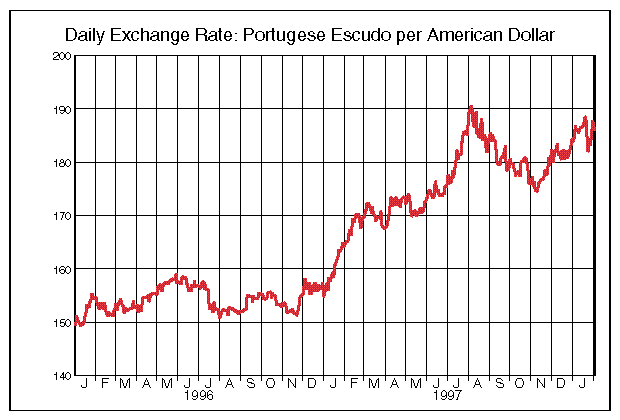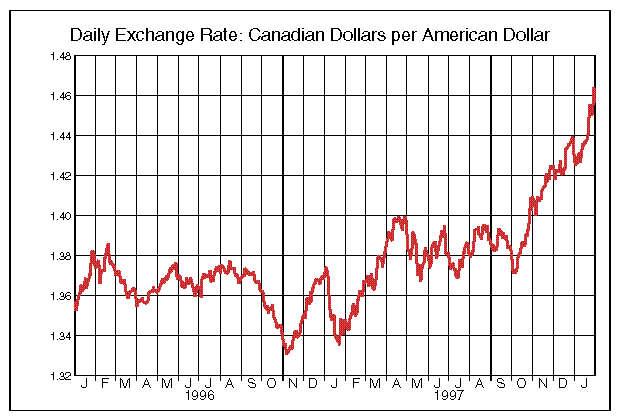When Central Banks Sell Gold, Their Currencies Devalue
The strength of any currency over time is a function of many economic factors, which are beyond the scope of this study to discuss. However, there is one cardinal factor which destines a currency to DEVALUATION... that is when a country's Central Bank embarks upon the foolhardy exercise of selling off its GOLD RESERVES - for whatever spurious reasons and/or rationalizations the controlling politicians invent.
Specifically, this analyst intends to provide empirical data to support the hypothesis:
WHEN CENTRAL BANKS SELL GOLD, THEIR CURRENCIES DEVALUE
Following are the officially reported yearly Gold Reserves held by mayor Central Banks during the last eight years.
| Central Bank Holdings (millions of troy ounces)* | ||||||
|---|---|---|---|---|---|---|
| 1990 | 1992 | 1994 | 1996 | 1997 | Gold Sold** | |
| United States Japan Denmark France Germany Greece Italy Norway Spain Switzerland United Kingdom Canada Australia Austria Belgium Netherlands Portugal Sweden |
261.9 24.2 1.7 81.9 95.2 3.4 66.7 1.2 15.6 83.3 18.9 14.8 7.9 20.4 30.2 43.9 15.8 6.1 |
261.8 24.2 1.7 81.9 95.2 3.4 66.7 1.2 15.6 83.3 18.6 9.9 7.9 19.9 25.0 43.9 16.1 6.1 |
261.7 24.2 1.6 81.9 95.2 3.5 66.7 1.2 15.6 83.3 18.4 3.9 7.9 18.3 25.0 34.8 15.8 6.1 |
261.7 24.2 1.7 81.9 95.2 3.5 66.7 1.2 15.6 83.3 18.4 3.1 7.9 10.7 15.3 34.8 16.1 4.8 |
261.7 24.2 1.7 81.9 95.2 3.5 66.7 1.2 15.6 83.3 18.4 3.1 2.6 10.1 15.3 27.1 14.0 4.8 |
Zero Zero Zero Zero Zero Zero Zero Zero Zero Zero Zero -79% -67% -58% -49% -38% -26% -21% |
| Subtotal | 793.1 | 782.4 | 764.3 | 746.1 | 730.4 | -7.9% |
| TOTAL | 1,143.8 | 1129.9 | 1115.8 | 1104.9 | 1099.5 | -3.8% |
|
(*) As of July 3 Source: International Monetary Fund, CPM Group (**) Gold sold during recent period, expressed as percent of total GOLD RESERVES HELD EARLIER. |
Now let's compare Central Bank diminishing GOLD RESERVES versus the strength of their individual currencies - or lack thereof. Unequivocally, can we correlate Central Bank Gold Sales to subsequent devaluation of its currency in terms of the U.S. dollar. Frankly, the results - although not surprising to this analyst - are overwhelmingly convincing.
| Gold Sold Vs Subsequent Currency Devaluation | |||
|---|---|---|---|
| Gold Sold** |
Recent* Devaluation |
Period to Devaluation |
|
| Canada Australia Austria Belgium Netherlands Sweden Portugal |
-79% -67% -58% -49% -38% -21% -27% |
-11% -26% -31% -32% -31% -23% -26% |
12 months 9 months 19 months 19 months 19 months 10 months 9 months |
| Average | -48% | -26% |
|
(*) Recent devaluation with respect to the U.S. dollar |
Following are the Currency Charts of the seven hapless countries which sold a good portion of their Gold Reserves in recent years, thus causing substantial devaluation of their paper money. Specifically, The Canadian and Australian Dollars, Austrian Shilling, Belgium Franc, Dutch Gilder, Swedish Krone and Portuguese Escudo were all castigated severely for having foolishly divested themselves of their Gold Reserves. And the currency punishment continues today.






C O N C L U S I O N S
Various rather obvious conclusions may be gleaned from the above official data of Central Bank Gold Reserve holdings, subsequent sales of Gold Reserves, and consequent depreciation of the countries' currencies.
- Seven major countries sold a substantial amount of gold holdings in recent years. Their Gold Reserves diminished by an average 48%. Consequently, the currencies of the seven gold sellers lost an average of 26% during a period of 9-19 months - and are still losing value as this report is written.
- Eleven major countries SOLD NOT ONE OUNCE OF GOLD DURING THE PERIOD - which obliterates the false theory that gold has little value.
- The total amount of Gold Reserves held by major Central Banks (1,143.8 million ounces) diminished by only 3.8% during the entire period. This belies the international news media claim that there is massive Central Bank gold selling -- which means Central Banks have propagated an untrue story in order to subdue the gold price.
- Last December the Argentine government sold ALL OF ITS 124 METRIC TONNES OF GOLD RESERVES. Reportedly, it bought U.S. T-Bonds with the proceeds. And although the Argentine peso is tied to the U.S. dollar by law, it is not the "paper-law" which determines how the world market will value your currency. Therefore, based upon the empirical evidence of this report, and supported by many decades of Banana Republic monetary history, this analyst believes there is indeed a high probability that the Argentine peso will convert to pasta. Furthermore, the likelihood of a massive Argentine peso devaluation increases exponentially if its major trading partner, Brazil, succumbs to the spreading Domino Effect - as are present indications.
This also, unfortunately, has political implications. Argentina SOLD ALL ITS GOLD RESERVES at the bottom of the market in December 1997 - and reportedly bought U.S. T-Bonds at their high. In the event the gold bull has started, and is accompanied by rising interest rates worldwide, well, the current Argentine Administration will suffer the impossible task of trying to explain the monetary fiasco to its irate voters in the next election... and who knows, maybe even before - as is custom!
| Empirical evidence demonstrate that a country's currency will devalue a little more than 1/2% for every one percent it reduces its Gold Reserves. |
vronsky
7 February 1998

















